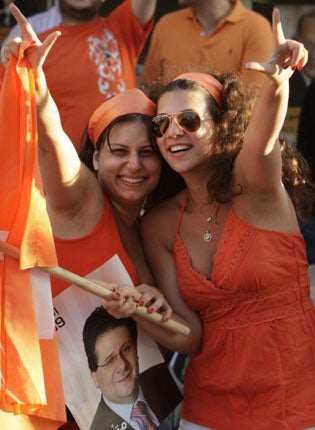Lebanese voters prevent Hizbollah takeover
Government of 'national salvation' set to rule after pro-Western Saad Hariri fails to claim decisive victory

There will be no Islamic Republic of Lebanon. Nor will there be a pro-Western Lebanese republic. There will, after yesterday's vote – for the Hizbollah-Christian coalition and for the secular Sunni-Christian alliance – be a government of "national salvation" in Beirut, run by an ex-army general-president with ever-increasing powers.
Washington would have preferred that Saad Hariri, son of the assassinated ex-prime minister, came out with a clear win. But out of the shadows will come the same crippled, un-healable Lebanon; delightful, unworkable, poor old Lebanon, corrupt, beautiful, vanity-prone, intelligent, democratic – yes, definitely, democratic – and absolutely outside our powers to reform.
The electoral system – a crazed mixture of sectarianism, proportional representation and "list" fixing – means that no one ever really "wins" elections in Lebanon, and yesterday was no different. The "anti-Syrian" parties – the Sunnis, the Druze, half of the Christian community – made sure that their votes prevented a Hizbollah takeover, while the huge Shia vote – for Hizbollah and the Amal party and the Christians who follow the lead of the raving Christian ex-general Michael Aoun – made certain there would be no clear win for America's friends in the country.
But the president, who under Lebanon's unwritten constitution must be a Christian Maronite, will be able to fashion some kind of "central bloc" by midday today – or so all Lebanon hopes – which will include Hizbollah, the forces of anti-Syrian Sunni Islam, the Druze and even the Christians. The latter, always their own worst enemies in Lebanon, albeit a minority, will ironically be more powerful than ever because their president is one of them.
Lebanon deployed up to 60,000 troops and armed police to control the ballot boxes and, to their considerable credit, not a single gun-battle appears to have broken out. Given the personal nature of some of the contests – this is a highly tribal society whatever the modernity of Beirut and its suburbs – this was quite an achievement. Driving around the capital, I found only good-natured checkpoints, handing me papers of candidates' names for whom I should vote, both Christians and Muslims, in the same list. If they wore blue hats, they were for Hariri. If they wore yellow hats – and there were conservative Shia Muslim women without scarves – they were for Hizbollah. If they dressed in orange, they were trying to win votes for Aoun.
The Lebanese, a very shrewd people, have been reading the foreign press and listening to the BBC, Al-Jazeera, even Fox News. They knew that for foreigners – the ajnabi – there was only one story: Lebanon becomes a finger of Iran or Syria – or it remains in America's hands. More dangerously, the Israelis would be able to claim it was a "terrorist" state if Hizbollah won. But then the Israelis would claim it was a "terrorist" state if even one minister was a member of Hizbollah. They will have their way.
By last night, it looked as if the spread of parties would win a share of the vote equal to their numbers; that the Shia Muslims would have the largest group of MPs but without a majority, thus allowing Lebanon's power-sharing system to settle back into its old ways. Why should we worry? Yes, it is corrupt. Tens of thousands of Lebanese flew home to vote – you can't vote abroad in Lebanese elections – so who paid their fare? Who has $30m to spend on air fares?
To be a modern state, Lebanon must de-confessionalise. Its president – currently the ex-general Michel Sleiman – should be elected on merit rather than religion. Its prime minister, who must be a Sunni Muslim, should be elected on merit. But the moment you take away these privileges, Lebanon will cease to be Lebanon – because its very identity is sectarian.
Lebanon is a tiny country, just over 4,000 square miles in size, and it is very definitely Muslim (60 per cent of its four million population are Muslim), but it has 18 religious sects which include the descendants of the poor Armenian Christians who, naked and beaten, dragged themselves here after their genocide at the hands of the Turks in 1915. The Assyrians came this way. So did the Persians, Romans, Crusaders, Mamlukes, Arabs and Ottomans. And the Americans, of course, And the Israelis.
Yesterday's election will probably have "united" the poor old Lebanese yet again. In what cauldron, we can only wait to find out.
The politics and the players
*Who were the main players in the parliamentary elections?
A coalition of pro-Western factions competed against an alliance linking the Iranian-backed, pro-Syria Hizbollah (Party of God) and a Christian faction led by the former army chief Michel Aoun. Sunni Muslims strongly supported the pro-Western grouping, which is led by Saad Hariri, the son of the murdered former prime minister Rafiq Hariri, while Shia Muslims supported the Hizbollah-led alliance. Christians were divided.
*Will these polls affect the wider Middle East?
Electoral success for Hizbollah would increase Syrian and Iranian influence over Lebanon, complicating efforts to restart the Middle East peace process. Israel failed to defeat Hizbollah in a 2006 war and would react negatively to its election. The US regards Hizbollah as a terrorist organisation and had vowed to review its aid to Lebanon if the Shia militant group won a place in government.
Join our commenting forum
Join thought-provoking conversations, follow other Independent readers and see their replies
Comments
Bookmark popover
Removed from bookmarks